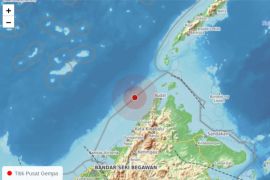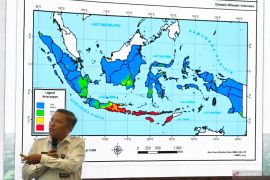"Starting in 2021, a joint research is being carried out by BMKG and LIPI to study earthquake precursors, focusing on earthquakes that have the potential to cause damages," Rahmad Triyono, Head of the Center for Seismology, Potential Geophysical Engineering and Time Signs of BMKG,, said in a statement here on Sunday.
Triyono explained that the research is to upgrade precursors owned by BMKG and to make them better.
"Currently, the precursors developed by BMKG have not been able to properly or accurately detect earthquakes with a large magnitude or with strength of more than 6.5," he said.
However, although the existing system has not been able to accurately detect potentially destructive earthquakes, the precursors have a fairly good level of accuracy (between 60-70 percent) for earthquakes with a magnitude of 5 to 6.
The accuracy of earthquake precursors developed by BMKG using earth magnets work better, with an accuracy of 80-90 percent, when the earthquakes have magnitude of around or less than 5.
"The level of accuracy for identifying major earthquakes is still not good, but for earthquakes with a magnitude of around 5, it has started to increase," he noted.
Earthquake precursors using the Earth's magnetic method are still being developed, but the information has been limited to BMKG internal use, because most of the earthquakes with a magnitude of 5 were not damaging or not even felt by the public,hence BMKG continues to develop it.
"Hence, this precursor will be able to predict earthquakes with a magnitude above 6," he said.
"In addition, (BMKG and LIPI) will also develop the earthquake precursors by combining various methods to confirm the parameters of the earthquake precursors that have been developed, such as Seismic Vp/Vs, earthquake history, Radon, soil temperature, and TEC (Total Electron Content)," Triyono said.
Translator: Devi Nindy SR, Katriana
Editor: Fardah Assegaf
Copyright © ANTARA 2021












